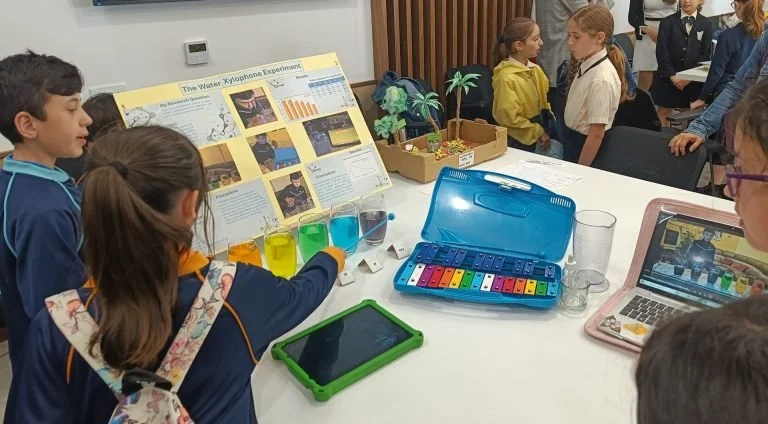16-23rd May: Chiswick House School and St Martin’s College Great Science Share for Schools
Chiswick House School's 'Great Science Share' started with inspiring career talks with pupils in Years 3-6. They created wonderful opportunities for students to connect directly with working scientists and see how their classroom learning translates into real careers.
The career talks combined with hands-on sessions is such an effective approach - students not only hear about different science pathways but get to experience the practical, experimental side that makes science engaging. Having Years 3-6 involved means you're catching students at the crucial age where they're starting to think more seriously about their interests and potential future directions.
The term "Great Science Share" itself advocates a collaborative, community-focused approach where knowledge and enthusiasm are being passed between professionals, teachers, and students. These interactions with working scientists can be incredibly inspiring for young learners and help them see science as accessible and relevant to their lives. It's always fascinating to see how schools create these bridges between academic learning and the professional world.
From exploring which type of chocolate melts the fastest to understanding how stars are made, Chiswick House School’s young scientists investigated fascinating questions like:
- How do clouds form and release rain?
- How were the planets formed?
- What are non-Newtonian fluids?
- Does basil survive better in direct sunlight or in the shade?
- What different seeds can we find in our school garden?
These exciting enquiries sparked imagination, critical thinking, and a love for scientific exploration.
Why are science fairs like this so valuable?
These events create a unique learning environment where students move from being passive recipients of information to active investigators and communicators.
The curiosity aspect is particularly powerful - when children get to explore questions they're genuinely interested in, rather than just following prescribed experiments, their natural inquisitiveness really flourishes. And the problem-solving element teaches them that science isn't just about memorizing facts but about developing systematic approaches to understanding and addressing real challenges.
The opportunity to share their ideas is equally important. When students present their work to peers, teachers, and professionals, they develop confidence in their scientific thinking and learn to communicate complex concepts clearly. There's something special about seeing a child light up when explaining their discovery or hypothesis to an engaged audience.
These fairs also change their view of science - every student can find something that fascinates them, whether it's investigating how plants grow, exploring physics through simple machines, or examining environmental issues in their local area. It shows them that scientific thinking is something they already do naturally when they wonder "what would happen if..." or "why does this work this way?" The ripple effect often extends well beyond the event itself, sparking ongoing interests and conversations that continue in classrooms and at home.
Pupils at Chiswick House School met science professionals and took part in activities ranging from naming bones in a skeleton, learning about pressure: both in space and underwater to interacting with an AI character named Pluto!
Take part
There are so many benefits to pupils when taking part in GSSfS:
Empowering young scientists
Improved communication skills
Developing interest / curiosity in science
Improving confidence
Developing problem-solving skills
Increasing inquisitiveness
Collaboration with many different people
Sign up to GSSfS today to take part and get your pupils connecting, communicating and collaborating with a range of audiences and celebrating their science!
“The highlight of the week was the Primary STEM Challenge showcase where young participants enthusiastically presented and discussed their own research projects related to one of the themes – nature, sound or colours. Throughout the fair, students were encouraged to ask questions, investigate and learn about the impact of science on our lives”
“What a fantastic week of scientific discovery and curiosity at Chiswick House School! Pupils exciting enquiries sparked imagination, critical thinking, and a love for scientific exploration. This linked to the global Great Science Share for Schools, which is a free and inclusive campaign for teachers and pupils aged 5-14 year olds.”
By Ingrid Bonello and Frances Hunt

